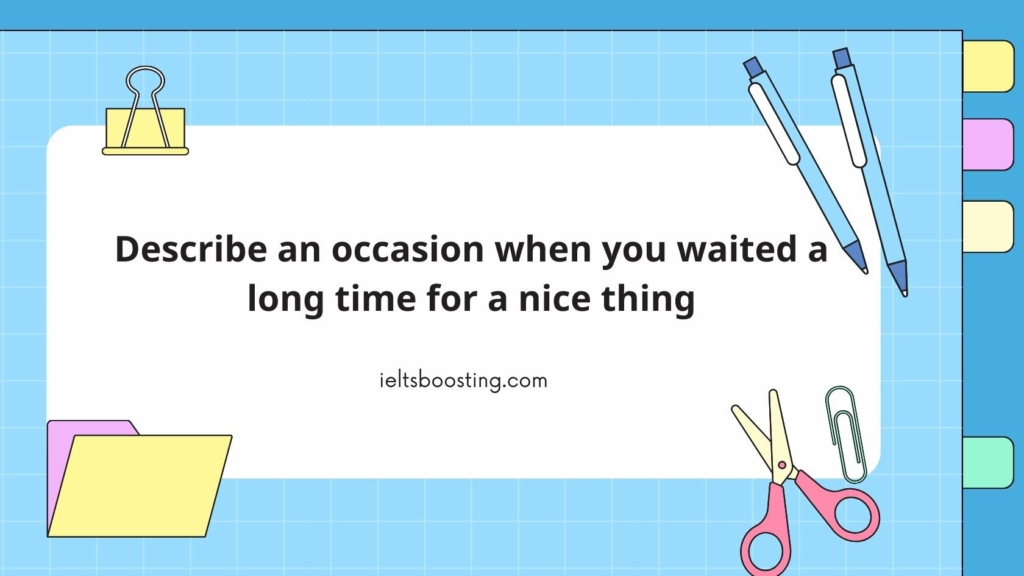Describe an occasion when you waited a long time for a nice thing
You should say:
- When it happened
- What the nice thing was
- How long you waited
- Why you waited for a long time
- And explain how you felt about the experience
Sample answer to describe an occasion when you waited a long time for a nice thing
One occasion when I waited a long time for something nice was when I was anticipating the arrival of my new bicycle. This happened about three years ago, during the summer. The bicycle I was waiting for was a custom-made mountain bike that I had ordered online. It was a model I had been eyeing for months, and after saving up enough money, I finally placed the order.
The waiting period was approximately six weeks, which felt like an eternity at the time. The main reason for the long wait was that the bike had to be assembled and shipped from overseas. Additionally, there were some delays due to customs and shipping issues, which further extended the wait.
During this period, I checked the delivery status almost every day and could barely contain my excitement. The anticipation was a mix of impatience and thrill, as I had planned several cycling trips with my friends as soon as the bike arrived.
When the day finally came, I was over the moon with joy. The bike was everything I had hoped for, and the wait suddenly seemed worth it. The experience of waiting taught me patience and made me appreciate the bike even more. I felt a great sense of accomplishment and satisfaction, knowing that my perseverance had paid off.
Explore more: ielts speaking part 2
Vocabulary
- Anticipate /ænˈtɪsɪpeɪte/
Meaning: Looking forward to something; expecting.
Example: I was eagerly anticipating the start of the holiday season.
- Custom-made/ˈkʌstəm meɪd/
Meaning: Made to order according to the customer’s specifications.
Example: He was thrilled to receive his custom-made suit for the wedding.
- Eternity/ɪˈtɜrnɪti/
Meaning: An endless or seemingly endless period of time.
Example: The last few minutes of the test felt like an eternity.
- Assembled/əˈsɛm.bəld/
Meaning: Put together parts to form a whole.
Example: The team assembled the new desks in the office.
- Impatience/ɪmˈpeɪʃəns/
Meaning: The feeling of being annoyed or irritated due to waiting for something.
Example: Her impatience grew as she waited in the long queue.
- Perseverance/ˌpɜrsəˈvɪrəns/
Meaning: Continued effort to do or achieve something despite difficulties.
Example: His perseverance in studying paid off when he passed the difficult exam.
- Over the moon (idiom)
Extremely happy or delighted.
Example: She was over the moon when she heard about her promotion.
- Contain/kənˈteɪn/
Meaning: To hold back or keep in check.
Example: He could hardly contain his excitement on his graduation day.

Describe an occasion when you waited a long time for a nice thing
Part 3
On what occasions do people have to wait for a long time?
Well, there are several occasions when people find themselves waiting for extended periods. One common situation is when waiting for public transport, like buses or trains. During peak hours or in less frequent routes, the wait can be quite lengthy. Another instance is at airports. Flights can be delayed for various reasons, such as bad weather or technical issues, leading to long waiting times for passengers.
What do people do while waiting?
People do a variety of things to pass the time while waiting. One of the most common activities is using their smartphones. They might browse social media, read the news, or play games. It’s a convenient way to stay entertained and make the waiting time feel shorter. Some people may bring a book or a magazine to read, which is a great way to utilize the waiting period productively.
Are most people patient while waiting?
In my experience, it really depends on the individual and the circumstances. Some people are naturally more patient and can handle waiting with ease, perhaps using the time to relax or catch up on reading. Others, however, may become quite impatient, especially if they are in a hurry or if the waiting time is unexpectedly long.
Why do most children have difficulties waiting for a long time?
Most children struggle with waiting for extended periods because they naturally have shorter attention spans and less developed self-control compared to adults. They tend to be more impulsive and find it hard to stay focused on a single activity for a long time. Additionally, children are often more curious and energetic, which makes it difficult for them to remain still and patient.
Tham gia group luyện thi IELTS để thảo luận và nâng cao band IELTS


